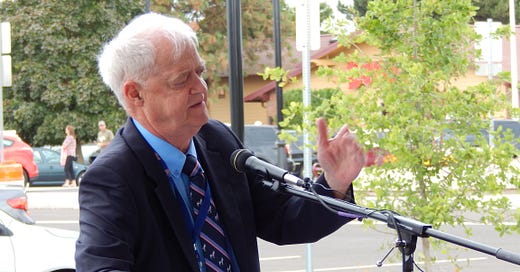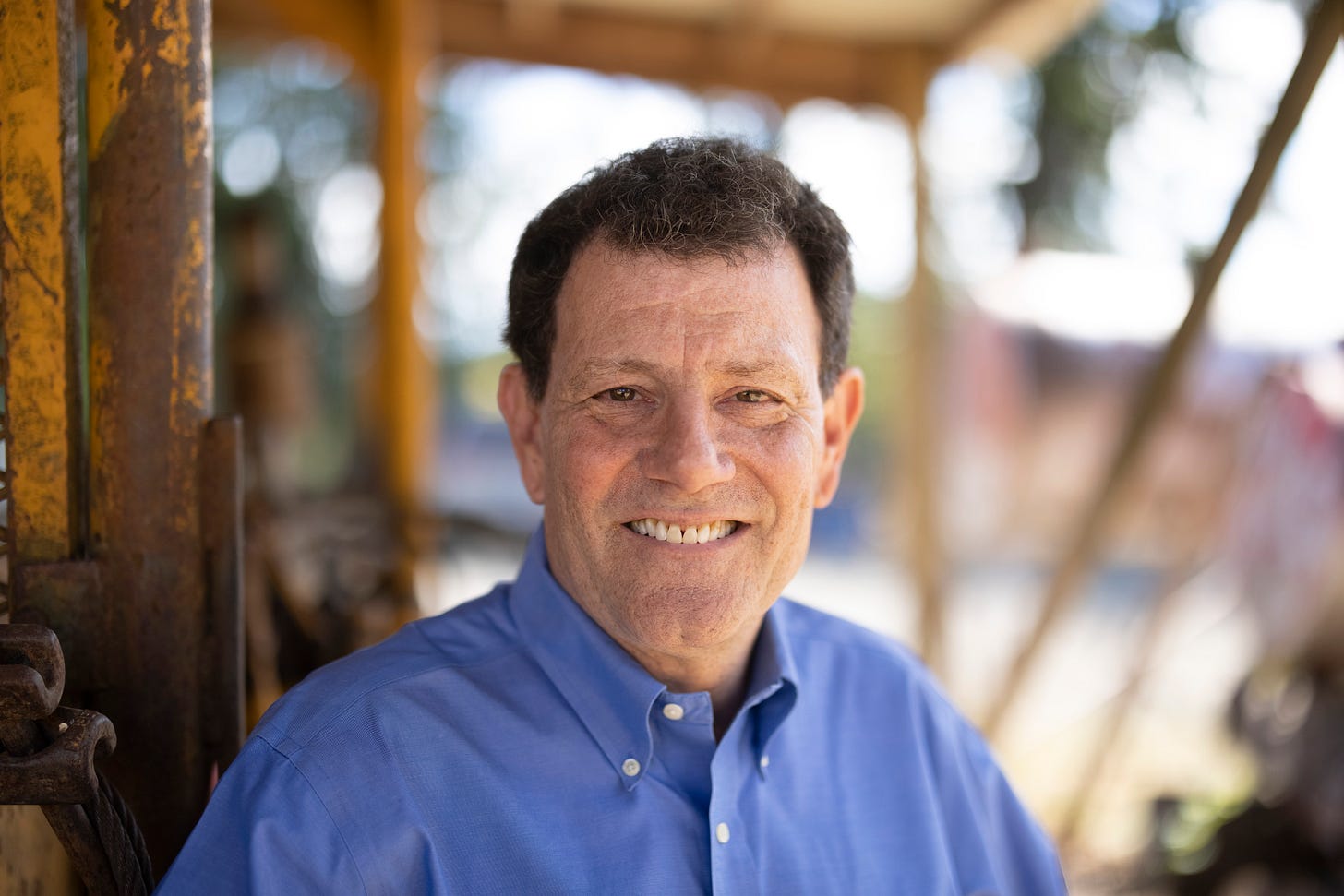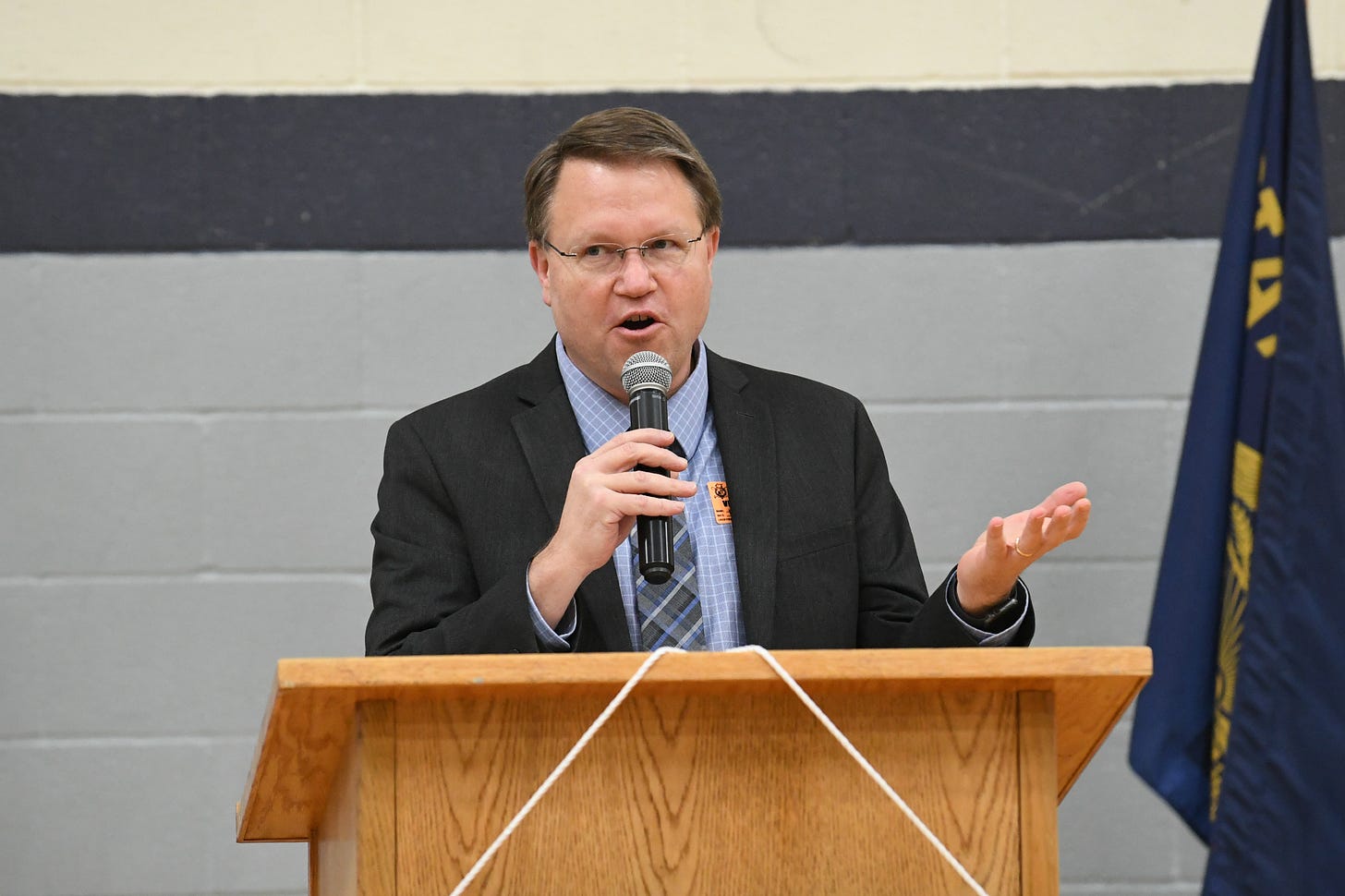The Liftoff: The most chaotic week in Oregon politics in years
Courtney, Kotek, Kristof, oh my! PLUS: The top issues to pay attention to in 2022, state agency executive profiles, research on how Oregonians feel about the future, and a new podcast episode.
Welcome back to The Liftoff! Most political observers have acknowledged that the 2022 election will be unusually consequential. This week, that reality came into sharper focus. In the newsletter this week, we discuss the implications of some big developments, and what they’ll mean for the future of Oregon politics.
If you find value in today’s newsletter, considering joining our growing community of paid subscribers. In the coming weeks, we will have some content reserved only for our paid subscribers—now is a great time to join!
1. Seismic shifts coming in the Oregon State Senate
The Senator Peter Michael Coleman Courtney era of the Oregon legislature will come to an end in 2023. The Senate President announced he won’t run for reelection. Courtney first joined the legislature in 1981 and has served as Senate President since 2003. The seismic impact of him leaving (particularly at the same time Speaker Tina Kotek is stepping down from her role) cannot be overstated. So who are his potential successors? Here are some names we’ve heard floated, assuming Dems hold on to the majority:
Sen. Rob Wagner (current Majority Leader)
Sen. James Manning (current President Pro Tempore)
Sen. Kate Lieber
Sen. Elizabeth Steiner Hayward
Sen. Lew Frederick
Sen. Kathleen Taylor
The vote won’t take place until after the 2022 general election, so *lots* can change. Republicans optimistically see a path to 16 seats in the Senate, which would obviously mean none of the above. But, if Democrats retain the majority in the senate, Courtney’s retirement means it’s likely that the chamber will move to the left under new leadership and membership. That may also mean more discord and hostility.
In other state senate news, precinct committee people (PCPs) in Senate District 16 have identified three potential successors to complete the term of former Sen. Betsy Johnson: Melissa Busch, Rachel Gowland, and Nadia Gardner. Johnson has already made clear she prefers someone who won’t run for re-election (i.e. Busch), and the conservative county commissioners will have more weight than the progressives in the vote.
Meanwhile, PCPs in Senate District 15 only had three names to choose from, so they all move forward—but they did get ranked. With 139 votes, State Rep. Janeen Sollman earned a commanding 85% for first place; labor organizer Lamar Wise earned 13% with 22 votes, and Hillsboro City Councilor Anthony Martin came in third place with 2 votes.
2. What to make of the wildest week yet in the race to be the next Oregon governor
After submitting over 100 pages to the Secretary of State’s office to argue that he meets the residency requirement to run for Governor, Nick Kristof has officially been booted out of the race by Secretary of State Shemia Fagan (for now). The Capitol Chronicle outlines in detail the challenges Kristof faces (and what he has and hasn’t provided publicly). Kristof has already filed an appeal to the Oregon Supreme Court.
One important takeaway: any notion that this would be a friendly primary has been extinguished. Here’s a summary of some of the fiery language being traded:
Fagan said that Kristof’s belief that Oregon is his home is “simply dwarfed by the mountains of objective evidence that, until recently, he considered himself a New York resident,” then adding, “in the end, our election officials told me it wasn’t even a close call.”
In response, Kristof released a blistering statement slamming what he described as “the political establishment,” “the status quo,” “interest group lobbyists,” “insiders,” and the “political class.”
Then, State Treasurer Tobias Read released his own statement slamming Kristof’s statement, saying: “[Kristof] is choosing to shamelessly peddle conspiracies about dedicated career public servants in the state he wants to lead,” and then, “…attacking the process with conspiracies is beyond the pale. I can think of another out of touch New Yorker who does the same thing,” a thinly-veiled reference to Donald Trump.
As an additional wrinkle unlikely to promote civility, it appears that a dark money group is trying to manipulate Democratic primary voters. Nigel Jaquiss of WW theorizes that they are trying to help Kristof.
The bottom line: we still have five months to go, and then one of these candidate will be the Democratic nominee. It’s becoming harder to imagine a unified front heading into what may be the most challenging general election dynamic for Democrats since the 80s.
Meanwhile, on the Republican side, the newest GOP candidate for Governor, former House Republican Leader Rep. Christine Drazan, reported over $250,000 in contributions over the weekend, bringing her cash-on-hand total to nearly $550,000.
Interview of the Week: Betsy Johnson in Willamette Week. Buckle up because this is pure and unfiltered Betsy Johnson. We have excerpted some highlights:
“Portland is an accelerating death spiral disaster.”
She says her biggest regret is voting for the Student Success Act, a billion-dollar-a-year corporate activity tax that funds public schools.
On Nick Kristof: “It is one thing to sit in Manhattan pontificating about problems. It’s another thing to be back here in Oregon trying to fix them.”
On her path to victory: “I agree it’s a narrow path. I’ve been sort of an equal opportunity pisser-offer.”
On saying something nice about Speaker Tina Kotek: “She has taken the unchecked exercise of power to an art form.”
3. Trends and issues to pay attention to heading into the 2022 election
COVID Raging: Frustration about ongoing (and now surging) pandemic is cross-partisan. It’s dragging down President Joe Biden’s approval at the national level, and certainly a big contributor to Governor Kate Brown’s low approval rating in Oregon. “Pandemic fatigue” continues to grow while Oregon shatters its daily records for case counts (over 10,000 in one day!), and leaders haven’t re-introduced the kind of restrictions previously seen. The education workforce is being stretched so thin that schools are closing, and Governor Brown has again deployed the National Guard to support hospitals on the brink. And, there aren’t enough tests. Voters in 2022 will be thinking about which candidates are most likely to solve these crises.
The Rise of Workers: Here’s an odd contrast: in 2021 worker power seemed to be on the rise, as workers flexed their muscles with “The Great Resignation” and several labor unions held strikes or near-strikes—and at the same time, corporate profits are at record highs. This kind of economic environment could benefit economic populist candidates (in both parties).
The Changing Racial Justice Landscape: Diversity, equity, inclusion, and racial justice will continue to be central issues in the “new culture wars,” as we’ve seen in the Newberg School District. These fights are increasingly trickling down from national politics to the state and local level. The landscape is both dynamic and not strictly partisan—for example, read this new piece from Axios: “Latino groups want to do away with ‘Latinx’”, which quotes the head of the Congressional Hispanic Caucus, a Democrat, who has prohibited his staff from using “Latinx” in official communications.
Public Safety and Crime: 2021 was a record crime year for Portland as homicides and thefts rose dramatically. Republicans (and independents) are already using public safety (and the situation in Portland more broadly) as a talking point in their campaigns—expect this to escalate as the general election nears.
Housing Affordability and Homelessness: According to data from the Oregon Values and Beliefs Center, these two issues are at the top of the list of things Oregonians want their elected leaders to address. It’s also important to remember that housing affordability is not just a Portland issue: it’s a crisis in many parts of rural Oregon, too.
4. Major shake-up for House Democrats as Kotek focuses on her run for Governor
Tina Kotek is officially resigning from her role as Speaker so she can focus on her campaign for Governor—and she leaves a massive vacuum in the state house (as we’ve written about before).
First, there is the question of who replaces her. In the short term, the answer is Speaker Pro Tempore Rep. Paul Holvey of Eugene, a well-liked veteran lawmaker. It is not clear exactly how long the “short term” will last. Rep. Janelle Bynum has already announced her intention to run, and there is speculation that Rep. Dan Rayfield and Rep. Julie Fahey are interested.
Why does this matter? The speaker is not just the presiding officer/air traffic controller of the House; she is also the most important campaign fundraiser for the majority caucus (in this case, Democrats). Kotek was a hugely successful fundraiser for House Democrats. Her departure leaves a void for the caucus as it seeks to raise over $2 million for the next election cycle.
In other legislative news, State Senator Chris Gorsek, a Democrat from Troutdale, has come out in favor of School Resource Officers (SROs). You can read more context for this conversation, including comments from Gorsek’s legislative colleague Rep. Ricki Ruiz, in this article about SROs in the Gresham-Barlow School District. Ruiz was featured in a profile this week by the Oregon School Boards Association.
Remote access to public meetings is now permanent. This will include the legislature, state commissions, and local government.
End of an Era: Read this “exit interview”-styled profile of Brian Clem. The upcoming short session will be the first time in 15 years that Clem hasn’t been a state legislator.
5. Executive branch leaders get profiled
The Capital Chronicle is out with a profile of the Director of the Department of Education, Colt Gill. It covers his background, the challenging decisions he’s made as head of the agency, and his daily routine (he wakes up at 2:30am every day!). Here’s an excerpt:
He struggled with reading and got help from the special education team at his elementary school. He was a photographer on the high school newspaper, he said, because he did not feel like a strong writer. “Because I was not a great student, I never thought about going into education,” he said.
Meanwhile, because of a spike in COVID-19 cases, the Oregon Health Authority and Oregon Department of Education are encouraging school districts to cancel extracurricular activities, but leaving it to school districts to make the final call.
The Capitol Chronicle is also out with a profile of Lisa Charpilloz-Hanson, the new Director of Oregon Watershed Enhancement Board. The profile includes how she uses field trips to inform her role and how she’s prioritizing climate change in her new role (she started in November).
She’s overseen regulation and enforcement of farm fertilizers, pesticides and confined animal feeding operations. She created a compliance program for agricultural water quality in the state, controversial because it was voluntary and because it was overseen by the Agriculture Department, not the Department of Environmental Quality. She spent 14 years as the legislative liaison between the Department of Agriculture and state politicians, working on natural resources policy issues, including many that affected agricultural water quality and quantity issues in the Klamath Basin.
6. Best of The Bridge Podcast 2021
Alex, Ben and Buddy wrap up 2021 and reflect on some of the highlights of the podcast thus far! With some of our favorite guests like Alek Skarlatos, Sara Gelser, Katherine Gehl, Tobias Read, Val Hoyle, Jessica Gomez, Dirk Vanderhart, The Knopp Family, and many, many more, OR360 had a great first year—and the team is looking forward to all that is soon to come.
One big podcast goal for 2022? Grow our Youtube subscribers. You can subscribe for free here!
7. Oregonians are worried
In The Sound of Mountain Water, Wallace Stegner wrote: “One cannot be pessimistic about the West. This is the native home of hope.” This research from our friends at the Oregon Values and Beliefs Center paints a picture of deep and abiding pessimism in Oregon—a pessimism that is uncharacteristic of who we are (or at least who we used to be). Here’s hoping that 2022 brings a return to optimism.
8. News Round-up
Not great: “Oregon’s southernmost glacier has disappeared”.
“There’s likely enough buried ice to keep the creek going another 10 or 20 years, but then it will dry up and the little ecosystem will disappear…”
From OPB: “In December, leaders with Don’t Shoot Portland demanded the building be returned to a nonprofit managed by and for Black Portlanders. The group alleges the state and the Oregon Community Foundation, which currently oversees the building, have bungled a process for returning the historic site to the community, and allowed the property to fall into disrepair.”
Oregon shatters its COVID case count twice in a one week span and this spoke comes as health officials has revise Oregon’s hospitalization number dramatically upward. This is significant considering less than two weeks ago officials revised their hospitalization number downward.
Wild story of the week: Two men were rescued after writing “SOS” in the snow. The individuals were camping; they were picked up by a Coast Guard helicopter.
The Eugene Weekly featured a profile of 4th congressional candidate Andrew Kalloch.
Meanwhile, Labor Commissioner Val Hoyle (a fellow 4th CD candidate) reported bringing in $210,000 in last quarter of 2021.
A major worker strike could be coming to Portland city government.
A new (and growing!) language is being born right here in Oregon.
Thank you for reading.
Tips? Feedback? Ideas? Corrections? We want to hear from you! Email benjaminwbowman@gmail.com.
If you value this newsletter, please become a paying subscriber today. Your support will help us grow and offer more opportunities to this community. It’s just $10 a month!
Interested in advertising with us? Get in touch!












If Kristof, a New Yorker, can run for Oregon Governor then I can declare to be a resident of Idaho and be exempt from Oregon’s high income tax.